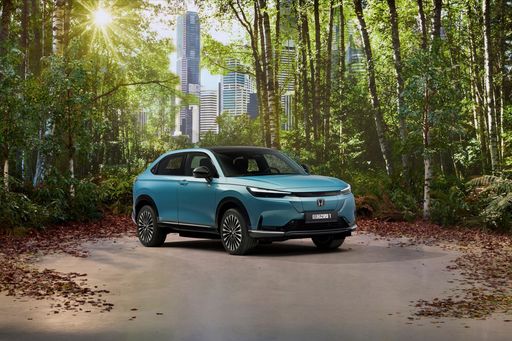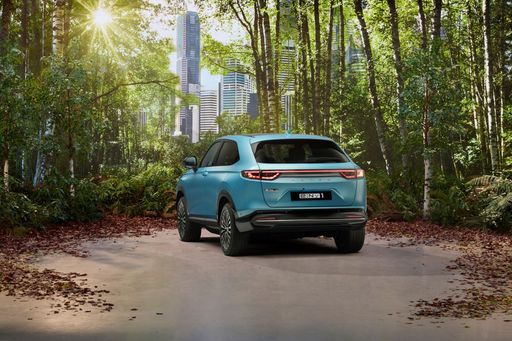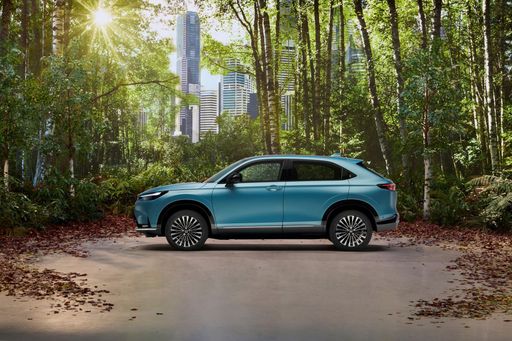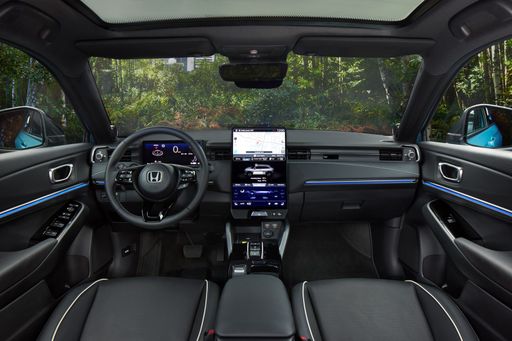Honda e:Ny1 vs Toyota C-HR – Differences & prices compared
Compare performance, boot space, consumption and price in one view.
Find out now: which car is the better choice for you – Honda e:Ny1 or Toyota C-HR?
The Honda e:Ny1 (SUV) comes with a Electric engine and Automatic transmission. In comparison, the Toyota C-HR (SUV) features a Full Hybrid or Plugin Hybrid engine with Automatic transmission.
When it comes to boot capacity, the Honda e:Ny1 offers 361 L, while the Toyota C-HR provides 447 L – depending on how much space you need. If you’re looking for more power, decide whether the 204 HP of the Honda e:Ny1 or the 223 HP of the Toyota C-HR suits your needs better.
In terms of consumption, the values are 18.20 kWh per 100 km for the Honda e:Ny1, and 0.80 L for the Toyota C-HR.
Price-wise, the Honda e:Ny1 starts at 33400 £, while the Toyota C-HR is available from 29100 £. Compare all the details and find out which model fits your lifestyle best!
Honda e:Ny1
The Honda e:Ny1 embodies the brand's vision for a sustainable and stylish urban driving experience. With its distinctive design and advanced technology, it offers a glimpse into the future of electric mobility. Inside, the cabin showcases a minimalist yet functional aesthetic, providing comfort and connectivity for modern drivers.
details @ hondanews.eu
@ hondanews.eu
 @ hondanews.eu
@ hondanews.eu
 @ hondanews.eu
@ hondanews.eu
 @ hondanews.eu
@ hondanews.eu
Toyota C-HR
The Toyota C-HR stands out with its distinctive and bold design that combines sleek, angular lines with a sporty posture. Its comfortable and stylish interior is equipped with advanced technology features, providing a seamless driving experience. The vehicle offers impressive handling and performance, making it a compelling choice for those who appreciate a blend of practicality and flair on the road.
details @ Toyota
@ Toyota
 @ Toyota
@ Toyota
 @ Toyota
@ Toyota
 @ Toyota
@ Toyota
 @ Toyota
@ Toyota

|

|
|
|
|
Costs and Consumption |
|
|---|---|
|
Price
33400 - 36000 £
|
Price
29100 - 42800 £
|
|
Consumption L/100km
-
|
Consumption L/100km
0.8 - 5.1 L
|
|
Consumption kWh/100km
18.20 kWh
|
Consumption kWh/100km
-
|
|
Electric Range
412 km
|
Electric Range
68 km
|
|
Battery Capacity
-
|
Battery Capacity
-
|
|
co2
0 g/km
|
co2
17 - 115 g/km
|
|
Fuel tank capacity
-
|
Fuel tank capacity
43 L
|
Dimensions and Body |
|
|---|---|
|
Body Type
SUV
|
Body Type
SUV
|
|
Seats
5
|
Seats
5
|
|
Doors
5
|
Doors
5
|
|
Curb weight
1730 kg
|
Curb weight
1505 - 1755 kg
|
|
Trunk capacity
344 - 361 L
|
Trunk capacity
350 - 447 L
|
|
Length
4387 mm
|
Length
4362 mm
|
|
Width
1790 mm
|
Width
1832 mm
|
|
Height
1584 mm
|
Height
1558 - 1564 mm
|
|
Payload
350 kg
|
Payload
375 - 425 kg
|
Engine and Performance |
|
|---|---|
|
Engine Type
Electric
|
Engine Type
Full Hybrid, Plugin Hybrid
|
|
Transmission
Automatic
|
Transmission
Automatic
|
|
Transmission Detail
-
|
Transmission Detail
-
|
|
Drive Type
Front-Wheel Drive
|
Drive Type
Front-Wheel Drive, All-Wheel Drive
|
|
Power HP
204 HP
|
Power HP
140 - 223 HP
|
|
Acceleration 0-100km/h
7.60 s
|
Acceleration 0-100km/h
7.4 - 9.9 s
|
|
Max Speed
160 km/h
|
Max Speed
175 - 180 km/h
|
|
Torque
310 Nm
|
Torque
-
|
|
Number of Cylinders
-
|
Number of Cylinders
4
|
|
Power kW
150 kW
|
Power kW
103 - 164 kW
|
|
Engine capacity
-
|
Engine capacity
1798 - 1987 cm3
|
General |
|
|---|---|
|
Model Year
2023
|
Model Year
2024 - 2025
|
|
CO2 Efficiency Class
A
|
CO2 Efficiency Class
C, B
|
|
Brand
Honda
|
Brand
Toyota
|
Honda e:Ny1
A Glimpse into the Future: The Honda e:Ny1
The automotive industry is no stranger to innovation, and Honda continues to spearhead this movement with its all-electric Honda e:Ny1 SUV. This vehicle represents the brand's commitment to energy efficiency, modern design, and cutting-edge technology, offering a remarkable driving experience that sets a new standard in the electric vehicle (EV) market.
Performance and Powertrain
At the heart of the Honda e:Ny1 is a robust electric motor that delivers an impressive 204 PS, equivalent to 150 kW, ensuring a dynamic and responsive driving experience. The vehicle can accelerate from 0 to 100 km/h in a brisk 7.6 seconds, making it one of the more swift options among electric SUVs. Thanks to a finely tuned reduction gearbox, the Honda e:Ny1 achieves a maximum speed of 160 km/h.
Efficiency Meets Range
The Honda e:Ny1 excels in energy efficiency, with a consumption rate of 18.2 kWh per 100 km. Even more impressively, it offers a substantial electric range of 412 km on a single charge, allowing drivers to confidently tackle longer journeys without frequent stops for recharging. Emphasising sustainability, the vehicle proudly holds a CO2 efficiency class of 'A', with zero emissions, further establishing its place in the realm of eco-friendly transportation.
Innovative Design and Comfort
Honda's design philosophy shines through in the e:Ny1, combining sleek aesthetics with practical features. Boasting a body length of 4,387 mm, a width of 1,790 mm, and a height of 1,584 mm, the SUV provides a spacious interior that comfortably seats five passengers. The design also incorporates a flexible boot space of 344 to 361 litres, accommodating various cargo needs.
Comfort is at the forefront of the e:Ny1's design, enhanced by standard features found in its Advance Package. These amenities are strategically designed to ensure a pleasant driving experience, be it through enhanced seating ergonomics or advanced climate control.
Technological Advancements
The Honda e:Ny1 is laden with technological innovations that are intuitive and user-friendly. From an advanced infotainment system to driver assistance features that ensure safety and ease, the SUV integrates technology seamlessly into the driving experience. This vehicle is equipped to meet modern connectivity needs, incorporating interfaces that are compatible with a range of digital platforms.
Investment Value and Running Costs
With a price range between €38,990 and €41,990, the Honda e:Ny1 represents a valuable investment for those looking towards electric mobility. Monthly running costs range from €1,125 to €1,171, with cost per kilometre between €0.45 and €0.469, reflecting its efficiency and low operational expenses.
Conclusion: Leading the Charge
The Honda e:Ny1 SUV encapsulates a perfected blend of power, efficiency, and style. With its impressive range, cutting-edge technology, and comfortable design, it stands as a tantalising choice for anyone considering the leap to electric vehicles. As Honda drives forward into the new era of automotive innovation, the e:Ny1 marks a significant milestone on the road to sustainable transport solutions.
Toyota C-HR
Revolutionising the Crossover Segment: The Toyota C-HR
The Toyota C-HR has firmly established itself as a standout contender in the compact crossover segment. Known for its distinct design and hybrid capabilities, the C-HR continues to prioritise innovation and efficiency. In this article, we delve into the technical details that make the 2024 iteration a compelling choice for discerning buyers.
Distinctive Design and Aerodynamics
The Toyota C-HR boasts a striking design that combines angular lines with modern aesthetics. This isn't merely for show; the design enhances aerodynamics, improving fuel efficiency and handling. With dimensions of 4362mm in length and a sophisticated structure, the C-HR strikes a balance between urban agility and on-road stability.
Impressive Hybrid Powertrains
The C-HR lineup offers innovative hybrid and plug-in hybrid drivetrain options. The full hybrid system is tailored for those who seek both economic and environmental benefits. It combines a petrol engine with an electric motor to deliver power outputs ranging from 140 to 223 PS, achieving remarkable fuel consumption rates from 0.8 to 5.1 L/100km. The 2.0 Plug-In Hybrid variant impresses with an electric range of 67 km, ideal for urban commuters.
Unmatched Efficiency and Performance
Acceleration figures for the C-HR range from 7.4 to 9.9 seconds to reach 0-100 km/h, ensuring a responsive driving experience. Maximum speeds between 175 and 180 km/h cater to those who appreciate a bit of zest on the open road. Coupled with CVT automatic transmission and both front-wheel and all-wheel-drive configurations, the C-HR adapts to various driving conditions with ease.
Advanced Technology and Features
Inside, the C-HR is equipped with the latest technology aimed at providing connectivity and comfort. The model hosts an array of features across its diverse trim levels, including Business Edition, Lounge, and the sporty GR SPORT. Each variant is designed to meet the demands of different lifestyles, ensuring there's a C-HR model to suit every taste.
Sustainability and Cost Efficiency
With CO2 emissions ranging from 19 to 115 g/km, the C-HR stands as a testament to Toyota's commitment to sustainability. Financially savvy consumers will also appreciate the running cost, with monthly expenses from €959 to €1204, and a cost per km as low as 38.4 cents. Such efficiency makes the vehicle an attractive option for eco-minded buyers.
Conclusion: A Forward-Thinking Choice
The 2024 Toyota C-HR embodies Toyota's forward-thinking approach to automotive innovation, blending eco-friendly hybrid technologies with stylish design and practicality. It offers a glimpse into the future of driving, where efficiency meets elegance. Whether you're a city dweller or an adventure seeker, the C-HR promises a driving experience that is both enjoyable and environmentally conscious.
The prices and data displayed are estimates based on German list prices and may vary by country. This information is not legally binding.
